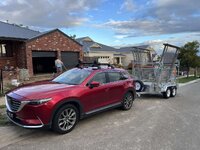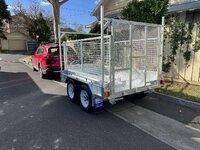Slightly related,
I've been reading up a bit more on things towing related and I found it quite interesting that the 10-15% is North American. Europeans apparently go by 4-7% tongue weight.
My understanding is just two different philosophies. Europe's thinking is you reduce tongue weight, you pull more without risking max GAWR or nosing up the vehicle, resulting in trailers with mass more centralized over the axle. While this certainly doesn't help with potential destabilizing oscillations (trailer sway) they have more strict towing speed limits (some EU countries are max 50mph or 80 km/h) and trailer brake requirements (EU requires brakes at ~1600 lbs loaded vs US ~3000 lbs unloaded) to greatly reduce the chances of sway. Also, If your car and trailer weight together is over 3.5t (~7700 lbs), then you need a special license.
North American system is heavily influenced by the SAE J2807 tow test (almost all major manufacturers use this standard here) and its definitely more safety-centric. Speed limits to my knowledge isn't drastically different from non-towing vehicles (except for California, but they're different on almost all accounts), and I've certainly seen enough idiots driving like it's a tractor pull.
Actually, the one thing I do notice a lot more now since I'm remotely interested in towing a camper, is the fact that so many people are not "level towing".
And you may have come across this in these forums, but the 3500lbs tow rating is for North American CX9. The same CX9's in Australia for example is rated for ~4400 lbs. I'm just curious since the trailer I'm looking to tow has a GVWR of 3,650 with a UVW of 3180. Of course I could easily stay under the 3,500 rated on the CX9 by not loading a lot in the trailer, but just a thought if that 150 lbs will make a huge difference.


